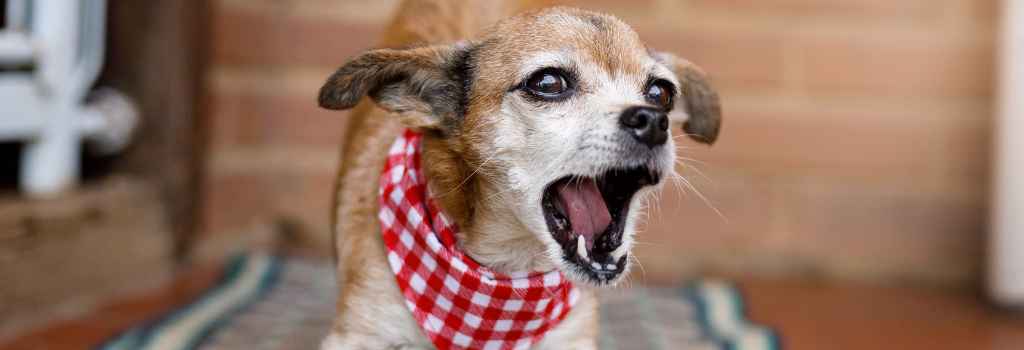If a single knock at the door sends your dog scurrying under the bed or they start barking every time the doorbell rings, it’s probably safe to say you both dread surprise guests and package deliveries, not to mention Halloween. But could these reactions to everyday noises mean something’s wrong?
If your dog shows excessive fear toward these and other noises, like fireworks, there’s a chance they may be suffering from noise aversion.
What Is Noise Aversion in Dogs?
Noise aversion in dogs is characterized as excessively fearful or anxious responses to certain loud and unexpected sounds, such as thunderstorms, car alarms, sirens, fireworks, construction work, or a running vacuum.
Common signs of noise aversion in dogs include:
- Pacing or restlessness
- Excessive panting
- Trembling or shaking
- Hiding or cowering
- Lip licking
- Hypervigilance
- Vocalization, such as whining, barking, or howling
- Owner seeking or excessive clinginess
- Destructive behaviors, such as chewing and digging
There are a number of factors that can potentially contribute to a dog developing noise aversion during their lifetime, including genetic predisposition, previous negative experiences with loud sounds, sensitivities related to aging, and, in some cases, underlying anxiety disorders or previous trauma.
Noise Phobia in Dogs
In some cases, a dog’s responses to these loud and unexpected sounds can cause their fear and responses to become so extreme that they go beyond traditional noise aversion and develop noise phobia instead. Though these two conditions are very closely related, there are some key differences that owners should be aware of in order to determine the severity of their dog’s noise anxiety and fear.
While noise aversion is typically thought of as a broader term to describe a dog’s fearful reactions to sounds, noise phobia in dogs, on the other hand, is the more severe end of the response spectrum, where a dog’s fear becomes intense, irrational, and persistent, often leading to panic-like responses and non-typical behavior.

Why Halloween Can Be Extra Scary for Pets With Noise Aversion
Noise aversion in dogs can be triggered by sounds any day of the year, but holidays like Halloween can be especially difficult for pets with noise-related anxiety. With tons of trick-or-treaters knocking on the door, loud music from neighborhood parties, and even spooky sound effects from a horror movie on TV, there’s no shortage of sounds on Halloween night that could stress your dog out and make their Halloween night extra scary.
Some of the most common Halloween sounds that might give your dog with noise aversion a scare include:
- Fireworks or firecrackers – Sudden, unpredictable bangs are one of the biggest triggers for dogs with noise sensitivity. While Halloween isn’t usually a big night for fireworks, some neighborhoods or community events may use them in their celebrations, so it’s always a good idea to be prepared for them on any major holiday.
- Constant doorbells and knocking – Repeated raps on the door and the doorbell chiming every few minutes can create confusion and stress, especially for territorial or protective dogs.
- Excited voices and shouting – Groups of trick-or-treaters laughing, yelling, or talking loudly near the door or outside windows can make some dogs anxious.
- Loud music or party sounds – Bass-heavy music, sound effects, and Halloween-themed noises (screams, spooky laughter, howls) can all be distressing to dogs that are sensitive to loud and unfamiliar noises.
- Footsteps and rustling outside – The sound of people walking, dragging costumes, or carrying candy bags can be enough to keep nervous dogs on edge.
- Unfamiliar household noises – Decorations that move or make noise (animatronics, motion sensors, strobe lights) can also startle pets.
Is Dog Noise Aversion a Big Deal?
Even if it doesn’t seem serious at first, noise aversion — and especially noise phobia — can be highly distressing and disruptive for both dogs and their families. What may look like an overreaction or simple excitement in response to certain sounds is actually a sign of significant stress. Over time, mild noise aversion can escalate into a full-blown phobia, leading to chronic anxiety that can impact a dog’s sleep, behavior, and overall well-being.
In severe cases, dogs may panic and try to flee from the noise, putting themselves at risk of injury, getting lost, or damaging property in their attempt to escape. This can be particularly dangerous on Halloween night, when there are more people, noises, and distractions outside in the dark.

How to Manage Dog Noise Aversion on Halloween
Noise aversion occurs in dogs of all breeds and ages. In fact, according to one study, 2 out of 3 dogs have shown a fear of loud noises. If you suspect your dog is one of them, the first step is to consult with your veterinarian, who can help you pinpoint the cause and severity of your dog’s noise aversion — and help you develop a plan to conquer it.
You may find that a few small changes to your dog’s daily routine can make a big difference. Start by:
- Going for a long walk. Encouraging your dog to release excess energy before the festivities begin will tire him out and help him relax at home.
- Providing a safe haven during peak trick-or-treating hours. Keeping your dog in a separate room away from the front door will also prevent him from running outside, where he may become lost.
- Offering a distraction, such as a new toy. This can help him focus his attention on something other than the noises outside.
- Mask unusual sounds with white noise, TV, or soothing music. These familiar sounds can help drown out the frightening ones.
In addition, your veterinarian may recommend:
- An anxiety jacket that provides calming pressure
- A pheromone collar or diffuser that mimics a mother dog’s signals of comfort and security
- Behavior supplements that help dogs manage situational stress
- Prescription anxiety or noise aversion medications
Together with proper behavior training year-round, these tricks can help make Halloween a treat for you and your dog. If you have questions and you'd like to reach out to us, you can call us directly at (303) 625-9266, or you can email us at [email protected]. Don't forget to follow us on social media https://www.facebook.com/7HillsVet/" target="_blank">Facebook, Instagram.
